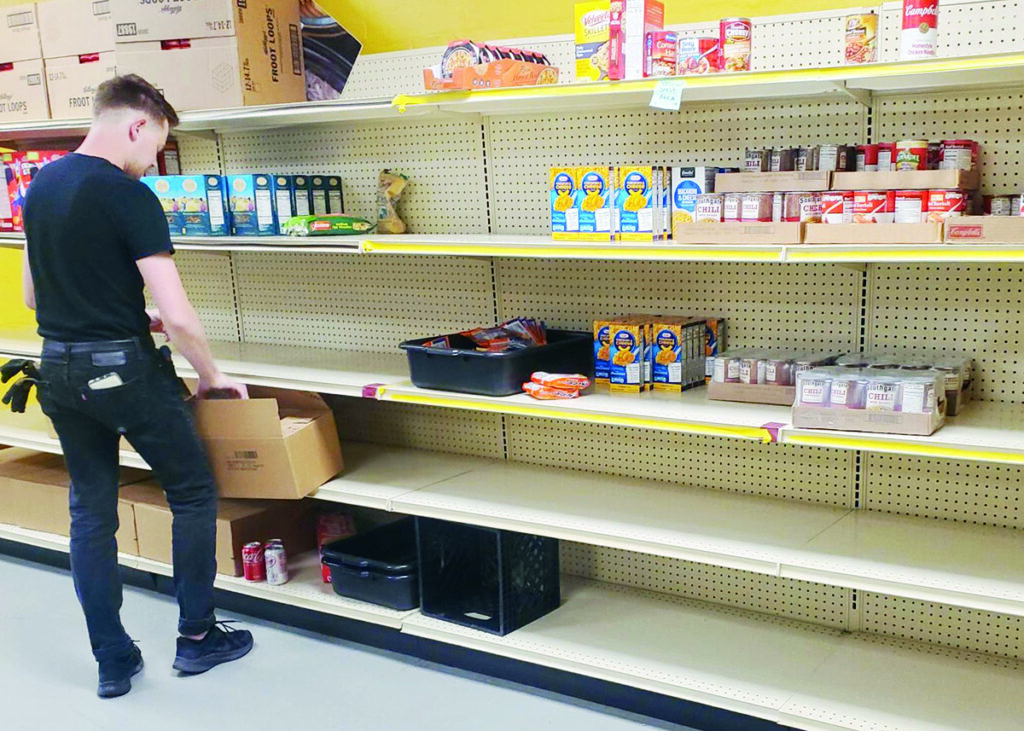Nancy Edmonds Hanson

While families’ need for food has doubled in the past year, the Dorothy Day Food Pantry is facing a serious crunch due to rising food costs, inflation and supply chain issues. (Photo/Shelby Wheeler.)
The community’s need for emergency food has doubled in the past year at the Dorothy Day Food Pantry at 1308 Main Ave. in Moorhead. Yet rising food costs, zooming inflation and lingering snarls in the supply chain have left some of the 25-year-old program’s shelves discouragingly bare.
“We used to expect our highest demand to come around Thanksgiving,” says Pastor Sue Koesterman, who has directed the pantry’s sponsoring organization, Churches United, since 2016. “But over past months, we have seen that level of demand every single week.”
Koesterman points out that times have been difficult for all emergency food pantries since 2020. When the pandemic struck, the Dorothy Day House of Hospitality and its food program had just merged with Churches United for the Homeless. COVID-19 and its nearly universal effects disrupted every aspect of life for the organizations under the Churches United banner, including not only the food pantry (and now its new sister program in West Fargo), but the three homeless shelters and supportive housing program it operates.
The Great Plains Food Bank, main supplier for most food programs throughout North Dakota and Moorhead, was beset by spotty availability and shipping challenges. Perishable foods required for nutritional balance – eggs, meat, fresh produce – were affected especially hard, forcing the pantry to purchase locally to round out the food choices it offered.
“It’s certainly not their fault,” Koesterman emphasizes. “Everyone felt the same pressures. But at times the amount of food we’ve had access to has been … less than ideal.” Around Easter, she says, the pantry sometimes had to stop its distribution early because it had run out of products.
The issue of supply has eased to some degree. But the far larger problem – the pandemic’s long-lasting effects on those who depend on the pantries to feed themselves and their families – has only become more dire.
The number of individuals and families seeking supplies has risen 15% over the past year, Churches United’s records show – a shocking rise in 12 months’ time. But the degree of need among those who depend on the Dorothy Day food shelves has increased far more dramatically.
During the first four months of 2022, demand has risen a shocking 100.46% over the same period in 2021.
Why is the need growing? “The people we serve are the ones who are hit first and worst by inflation, rising food prices and the price of gasoline,” Koesterman explains, “and they’re the ones who will feel the effects the longest. The stimulus checks helped for a time last year, but now they’re gone. Households on the lower end of the socioeconomic scale that had managed all right are now facing the hard choice of buying gas to get to work or feeding their families.” So far this year, the pantries have served 2,100 households with more than 1,400 children as well as 5,000 individuals.
She adds, “Our staff are seeing people come in for the first time ever, and others who haven’t needed a helping hand in five or six years. They were getting along all right … until all this happened.”
While the emergency food pantry acquires much of its stock of food, as well as nonfood items in great demand – diapers, toilet paper, feminine hygiene products, laundry soap – as very low cost through Great Plains, shortages of perishables mean it must pay more for perishables to maintain its commitment to sound nutritional choices.
“We are deeply, deeply appreciative of everyone who donates food and other products, including fresh produce from their gardens,” the executive director stresses. “But our most valuable donation is cash. We need it to buy what we need to fill in the gaps.”
And it’s needed, too, to maintain the workers who stock the shelves and serve the families whom they help feed.
A total of 73 men and women are now employed by Churches United. That includes the two pantries as well as three shelters (Micah’s Mission, the Dorothy Day House and Safe Haven, the newest, which serves women) and Bright Sky Apartments. “The labor shortage affects all of us,” Koesterman says. “We need to pay equitably to help them support their own families … and to keep them.”
Churches United sent a letter to supporters last week. Its appeal: “In order to keep providing nutritious food for our community, the Dorothy Day Food Pantries need your gifts.” It noted that because of relationships with the Great Plains Food Bank and discount purchasing programs, “we can stretch a dollar up to seven times farther than an individual consumer.”
Support for he food pantries can be donated online at www.churches-united.org. Options are available for one-time, monthly and quarterly giving.


